Faced with trade protectionism driven by environmental considerations, the Southern Cone should develop a common science-based vision that provides metrics and data that reflect the sustainability of its agricultural production, said specialists, leaders of stakeholder organizations, producers, academics and officials from Argentina, Uruguay, Brazil, Paraguay, Bolivia and Chile at an international symposium on food, energy, and climate change.

Gualeguaychú, Argentina, May 21, 2024 (IICA). Faced with trade protectionism driven by environmental considerations, the Southern Cone should develop a common science-based vision that provides metrics and data that reflect the sustainability of its agricultural production, said specialists, leaders of stakeholder organizations, producers, academics and officials from Argentina, Uruguay, Brazil, Paraguay, Bolivia and Chile at an international symposium on food, energy, and climate change.
The participants in the meeting, held in the Argentine city of Gualeguaychú, close to the border with Uruguay, included the Secretary of Bioeconomy of Argentina and President pro tempore of the Southern Agricultural Council (CAS), Fernando Vilella; the Minister of Livestock, Agriculture and Fisheries of Uruguay, Fernando Mattos; the Governor of the Argentine province of Entre Ríos, Rogelio Frigerio; and the Representative of the Inter-American Institute for Cooperation on Agriculture (IICA) in Argentina, Fernando Camargo.
There were two days of discussion with representatives of the Federation of Rural Associations of Mercosur (FARM); Argentine Rural Confederations (CRA); the Federation of Rural Associations of Entre Ríos (FARER); and the Rural Society of Gualeguaychú (SRG). The Institute for the Promotion of Argentine Beef (IPCVA) provided support. The large number of participants included lawmakers, officials, leaders of stakeholder organizations, and entrepreneurs.
During the discussions, emphasis was placed on the unique role that Latin American countries play as guarantors of both global food security and environmental sustainability, due to their wealth of natural resources. Emphasis was also placed on the need to step up scientific research that reflects the true environmental impact of agricultural production in the Southern Cone countries and the role of soils as a carbon sink that contribute to climate change mitigation.
Issues discussed
“We’re mindful of the fact that many of the actions carried out have an impact on the environment, and that must be corrected. But we also know that Argentina’s production system is one of the most sustainable in the world and there is evidence to prove it. We demonstrate it and explain it every time we have to talk about these issues,” Vilella remarked.
Argentina’s Secretary of Bioeconomy referred to Regulation 115, under which, starting next year, anyone who wishes to sell primary products to the European Union (EU) will have to demonstrate that their products have been produced on land that has not been subject to deforestation since December 31, 2020. In this regard, a few days ago the Secretariat of Bioeconomy announced the first shipment of certified deforestation-free beef to Germany, the main purchaser of Argentine meat among the EU countries.
“There are requirements that can be characterized as para-tariffs, but they reflect demands from consumers. And this leaves you having to choose between being right, or selling your products. Many issues are involved, and certain points are not science-based. But if we’d dug our heels in, we couldn’t have shipped the first batch of deforestation-free meat, and we wouldn’t be able to sell anything from January 1, 2025,” Vilella said.
The Uruguayan minister, Fernando Mattos, praised the efforts of producers to ensure sustainability and warned that “we’re now being faced with an enormous challenge from the point of view of the general concepts that govern trade. The fact that the World Trade Organization (WTO) is losing relative weight in the adoption of international rules, with environmental aspects coming to the fore, exposes us to an enormous risk. Protectionism is nothing new, we’ve had rules for more than 30 years that restrict our productive potential. But the problem is now getting worse, because they want to impose standards that aren’t supported by science.”
“Thus, as far as climate matters are concerned, we are rule-takers, with the rules imposed by the central world,” Mattos concluded.
Fernando Camargo noted that the Latin American and Caribbean countries are among those most at risk from the EU regulation on deforestation because they are major suppliers of products such as soybeans, beef, wood, cacao, coffee and palm oil.

Turning to private sector regional initiatives aimed at guaranteeing the continuity of trade with the EU, Camargo highlighted the case of Argentina. A traceability and monitoring platform called VISEC has been created to evaluate the environmental, social, and economic impacts of the production of soya and other commodities in priority areas, starting with the Gran Chaco.
He also mentioned the Soft Commodities Forum, with which six large companies operating in Brazil identify, invest in and scale solutions to eliminate soy-driven deforestation and native vegetation conversion, and to encourage sustainable use of the land.
The IICA Representative in Argentina referred to the importance of developing public policies that create economic instruments to encourage non-deforestation, such as payment for ecosystem services schemes, for forest conservation.
“IICA promotes collective action to strengthen a science-based approach that helps make the region’s international positions on climate change even stronger,” he said.
More information:
Institutional Communication Division.
comunicacion.institucional@iica.int











